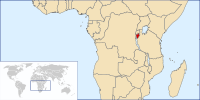Portal:Burundi
The Burundi PortalA view of Bujumbura, Burundi
Burundi (/bəˈrʊndi/ , /-ˈrʌn-/), officially the Republic of Burundi (Kirundi: Repubulika y’Uburundi,[1] [u.βu.ɾǔː.ndi]; Swahili: Jamuhuri ya Burundi; French: République du Burundi}}, [buʁundi] or [byʁyndi]), is a landlocked country in the Great Rift Valley where the African Great Lakes region and East Africa converge. It is bordered by Rwanda to the north, Tanzania to the east and southeast, and the Democratic Republic of the Congo to the west; Lake Tanganyika lies along its southwestern border. The capital cities are Gitega and Bujumbura, which is also the largest city.[2] One of the smallest countries in Africa, Burundi's land is used mostly for subsistence agriculture and grazing, which has led to deforestation, soil erosion and habitat loss.[3] As of 2005 the country was almost completely deforested, with less than 6% of its land covered by trees and over half of that being commercial plantations.[4] In addition to poverty, Burundi often suffers from corruption, weak infrastructure, poor access to health and education services, and hunger.[5] Burundi is densely populated and many young people emigrate in search of opportunities elsewhere. The World Happiness Report 2018 ranked the nation as the world's least happy with a rank of 156.[6] Burundi is a member of the African Union, Common Market for Eastern and Southern Africa, United Nations and the Non-Aligned Movement. Selected article -The president of Burundi, officially the President of the Republic (French: Président de la République), is the head of state and head of government of the Republic of Burundi. The president is also commander-in-chief of the National Defence Force. The office of the presidency was established when Michel Micombero declared Burundi a republic on 28 November 1966. The first constitution to specify the powers and duties of the president was the constitution of 1974 adopted in 1976. The constitution, written by Micombero, affirmed Micombero's position as the first president of Burundi. The powers of the president currently derive from the 2005 constitution implemented as a result of the 2000 Arusha Accords after the Burundian Civil War. The current president since 18 June 2020 is Évariste Ndayishimiye. The president's stated role is to represent Burundi's national unity and ensure that the laws and functions of the state are created and executed with full compliance in the constitution. The president is granted a variety of powers throughout the constitution. Title V establishes the executive powers granted to the president and Title VI establishes legislative powers granted to the president. The president has the power to appoint military commanders, ambassadors, magistrates, provincial governors and members of various national councils. The president also appoints all judges, including those of the Supreme Court and Constitutional Court. The president can organize government and can call for parliamentary sessions under extraordinary circumstances. In addition to promulgating legislation, the president has the power to propose and amend laws and can veto laws that parliament is unable to agree upon. The president can also amend the constitution. The president represents Burundi in international affairs by signing and ratifying its treaties. The president is the sole office to manage war, but needs approval from parliament and the National Council of Security to start wars. The president is the sole post that can authorize military action. The president is also the sole post to grant civil and military awards. (Full article...)General images -The following are images from various Burundi-related articles on Wikipedia.
More Did you know (auto generated)
Did you know -
Wiki Loves Africa in Burundi
CategoriesRelated portalsWikiProjectsSelected picture -TopicsAssociated WikimediaThe following Wikimedia Foundation sister projects provide more on this subject:
Sources
Discover Wikipedia using portals | ||||















































